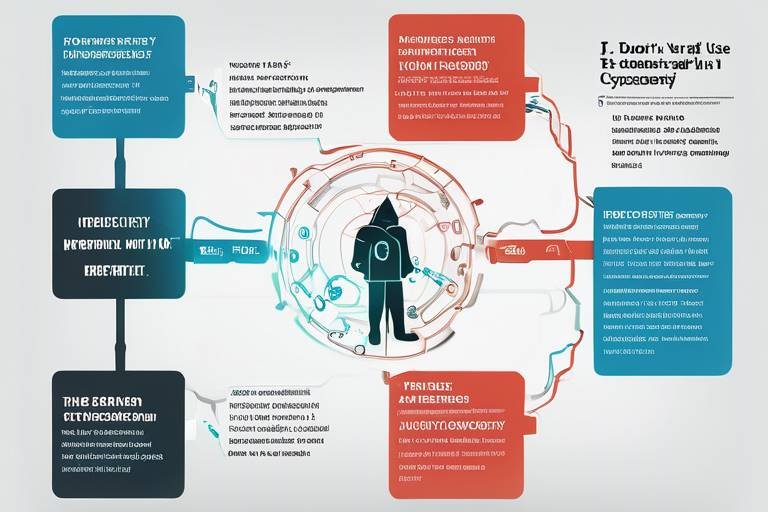Dealing with Cyber Threats in the Real Estate Industry
The real estate industry, like many others, is increasingly becoming a target for cybercriminals. With the vast amounts of sensitive data that real estate professionals handle, including personal client information, financial records, and property details, it’s no wonder that hackers are keenly interested in exploiting vulnerabilities. This article delves into the various cyber threats that the real estate sector faces and offers actionable strategies for mitigating these risks. By understanding these threats and implementing robust security measures, real estate professionals can ensure the safety of sensitive data and maintain the trust of their clients.
Cyber threats can take many forms, including phishing attacks, malware, and ransomware. Each of these threats poses unique challenges and requires different strategies for defense. For real estate professionals, understanding these threats is essential. It's not just about protecting your own information; it's about safeguarding your clients' data as well. Imagine handing over the keys to a house without knowing who you're dealing with—that's what it feels like to leave your data unprotected. By recognizing the types of threats out there, agents can better prepare themselves and their clients against potential harm.
Real estate professionals face a variety of cyber attacks, including data breaches, identity theft, and email scams. Recognizing these types of attacks can significantly improve an agency's defenses. For instance, a data breach can lead to the exposure of sensitive client information, while identity theft can result in financial losses and damage to reputation. Email scams often serve as the gateway for more severe attacks. By being aware of these threats, agents and agencies can implement better defenses and protect their clients' interests.
Phishing scams are deceptive attempts to obtain sensitive information by masquerading as trustworthy entities. These scams can come in various forms, including emails that appear to be from reputable companies or even colleagues. Real estate agents must be vigilant in recognizing these scams to protect themselves and their clients. Just as you wouldn’t trust a stranger asking for your bank details on the street, you should apply the same skepticism to unsolicited emails. The consequences of falling for these scams can be dire, leading to unauthorized access to sensitive information.
Identifying phishing emails involves looking for suspicious sender addresses, urgent language, and generic greetings. For example, if you receive an email from a sender that looks like it’s from a well-known bank but has a slightly altered email address, it’s likely a phishing attempt. Awareness of these signs can prevent falling victim to such scams, ensuring that your sensitive information remains secure. Always remember: if it seems too good to be true or feels off, it's better to err on the side of caution.
Preventing phishing attacks includes implementing email filters, educating employees about security practices, and encouraging clients to verify communications through trusted channels. For example, consider setting up a two-step verification process for sensitive transactions. This extra layer of security can significantly reduce the likelihood of falling victim to phishing scams. Additionally, regular training sessions for employees can help create a culture of security awareness within the organization.
Ransomware attacks can cripple real estate operations by encrypting critical data and demanding payment for access. Imagine waking up one morning to find that all your client files are locked away, and you’re being asked to pay a hefty ransom to regain access. Understanding how to defend against these threats is crucial for every agency. Regular backups, robust security measures, and employee training can help mitigate the risk of ransomware attacks.
To combat cyber threats, real estate agencies must adopt robust security measures, including firewalls, encryption, and regular software updates. These practices help safeguard sensitive client information. Think of these measures as the locks and alarms on your house; they may not prevent every intruder, but they certainly make it much harder for them to get in. By investing in security technology and keeping it up to date, real estate professionals can significantly enhance their defenses against cyber threats.
Data encryption is essential for protecting sensitive information from unauthorized access. Implementing strong encryption protocols can significantly reduce the risk of data breaches in the real estate sector. For example, using encryption for emails containing sensitive information adds an extra layer of security, ensuring that even if the data is intercepted, it remains unreadable to unauthorized users.
Keeping software up to date is vital for protecting against vulnerabilities. Regular updates ensure that real estate agencies have the latest security patches and features to defend against cyber threats. Just as you wouldn’t drive a car with outdated brakes, you shouldn’t operate your business on outdated software. Set reminders for regular updates, and make it a part of your routine to check for new versions of your software.
Employee training is a critical component of cybersecurity. Educating staff on best practices and potential threats can create a culture of security within real estate organizations. Consider hosting workshops or providing online courses that cover the basics of cybersecurity. When employees understand the risks and know how to recognize potential threats, they become the first line of defense against cyber attacks.
A well-defined cybersecurity policy outlines the protocols and procedures for handling sensitive data. Establishing such a policy is essential for guiding employees in maintaining security standards. This policy should be easily accessible and regularly reviewed to adapt to new threats. Just like a playbook for a sports team, having a clear strategy can make all the difference in how effectively your team responds to cyber threats.
Regular security audits help identify vulnerabilities within an organization’s systems. By assessing security measures, real estate agencies can proactively address potential weaknesses and enhance their defenses. Think of it as a health check-up for your systems; regular audits can catch issues before they turn into significant problems. Make it a practice to conduct these audits at least once a year or after any major system changes.
- What are the most common cyber threats in real estate? The most common threats include phishing scams, ransomware, and data breaches.
- How can I protect my real estate business from cyber attacks? Implement strong security measures, train employees, and develop a cybersecurity policy.
- Why is employee training important for cybersecurity? Employees are often the first line of defense against cyber threats, and training helps them recognize and respond to potential attacks.
- What should I do if I suspect a phishing email? Do not click on any links or provide any information; report the email to your IT department or email provider.

Understanding Cyber Threats
In today's digital age, the real estate industry is increasingly vulnerable to a myriad of cyber threats. As agents and agencies leverage technology to streamline operations and enhance client experiences, they inadvertently open doors to potential risks. Cyber threats can take many forms, including phishing attacks, malware, and ransomware. Understanding these threats is essential for real estate professionals to effectively protect their businesses and clients from potential harm. Just like a sturdy lock on a front door, having knowledge about these threats is the first line of defense against cybercriminals.
Phishing attacks, for instance, are deceptive attempts to obtain sensitive information by masquerading as trustworthy entities. Imagine receiving an email that looks like it’s from your bank, asking you to verify your account details. If you fall for it, you could be handing over your personal information to a scammer. Similarly, malware can infiltrate systems through seemingly innocuous downloads or links, wreaking havoc on data integrity and security. Ransomware, on the other hand, is particularly insidious; it can cripple real estate operations by encrypting critical data and demanding payment for access. Understanding these threats is not just about knowledge—it's about safeguarding the very foundation of trust that your clients place in you.
To further illustrate the landscape of cyber threats, consider the following table, which highlights some common cyber threats faced by real estate professionals:
| Cyber Threat | Description | Potential Impact |
|---|---|---|
| Phishing | Fraudulent emails or messages that appear legitimate. | Identity theft, loss of sensitive data. |
| Malware | Malicious software designed to damage or disrupt systems. | Data corruption, system downtime. |
| Ransomware | Software that encrypts data, demanding ransom for access. | Operational paralysis, financial loss. |
By recognizing these cyber threats, real estate professionals can take proactive steps to mitigate risks. It starts with a mindset shift—viewing cybersecurity not as a secondary concern, but as an integral part of business operations. This awareness can empower agents and agencies to adopt best practices, ensuring that sensitive client information remains protected and that trust is maintained. Remember, in the world of real estate, where client relationships are paramount, safeguarding data is not just a technical requirement; it’s a commitment to your clients’ peace of mind.

Common Types of Cyber Attacks
In the fast-paced world of real estate, where sensitive client information is exchanged daily, understanding the is crucial. Cybercriminals are constantly evolving their tactics, and real estate professionals must stay one step ahead to protect their businesses and clients. Let's delve into some of the most prevalent threats that agents and agencies face in this digital age.
One of the most alarming forms of cyber attack is the data breach. This occurs when unauthorized individuals gain access to confidential information, often leading to severe consequences such as identity theft and financial loss. In the real estate sector, a data breach could expose sensitive client data, including social security numbers, bank details, and property information. The repercussions can be devastating, not only for the affected clients but also for the agency's reputation.
Identity theft is another significant threat that real estate professionals must be aware of. Cybercriminals can impersonate clients or agents to gain access to sensitive information or conduct fraudulent transactions. This can happen through various means, including phishing scams or data breaches. The impact of identity theft can be long-lasting, affecting credit scores and financial stability.
Additionally, email scams are rampant in the real estate industry. These scams often involve fraudulent emails that appear to come from trusted sources. For instance, a scammer might impersonate a real estate agent or a title company, tricking clients into wiring funds to the wrong account. The sophistication of these scams makes them increasingly difficult to identify, which is why vigilance is essential.
To better understand the landscape of cyber threats, here’s a table summarizing some common types of cyber attacks in the real estate industry:
| Type of Attack | Description | Potential Impact |
|---|---|---|
| Data Breach | Unauthorized access to confidential information. | Identity theft, financial loss, reputational damage. |
| Identity Theft | Impersonation of clients or agents to access sensitive information. | Financial instability, legal issues, loss of trust. |
| Email Scams | Fraudulent emails that trick recipients into sharing information or funds. | Financial loss, compromised accounts, disrupted transactions. |
In conclusion, recognizing these common cyber attacks is the first step in building a robust defense against them. By staying informed and implementing proactive measures, real estate professionals can significantly reduce their vulnerability to these threats.
Q: What should I do if I suspect a data breach?
A: If you suspect a data breach, immediately change your passwords, notify your IT department, and monitor your accounts for any unusual activity.
Q: How can I educate my clients about cyber threats?
A: Share informative resources, conduct workshops, or send newsletters highlighting common scams and how to recognize them.
Q: Are there specific cybersecurity tools I should use?
A: Yes, consider using antivirus software, firewalls, and email filtering tools to enhance your cybersecurity posture.

Phishing Scams
Phishing scams are like the wolves in sheep's clothing of the digital world. They are deceptive attempts designed to trick you into revealing sensitive information, such as passwords, credit card numbers, and other personal data. These scams often masquerade as legitimate communications from trusted entities, making it crucial for real estate agents to stay alert. Imagine receiving an email from what appears to be a well-known bank, asking you to verify your account details. It looks official, but it’s a trap! The stakes are high, especially in the real estate sector, where sensitive client information is often at risk.
Recognizing phishing emails is the first line of defense against these threats. There are several telltale signs that can help you spot a phishing attempt:
- Suspicious Sender Addresses: Check the email address closely. Often, phishing emails come from addresses that look similar to legitimate ones but have subtle differences.
- Urgent Language: Phishing emails often create a sense of urgency, pressuring you to act quickly without thinking.
- Generic Greetings: If the email starts with a generic greeting like "Dear Customer" instead of addressing you by name, it’s a red flag.
Being aware of these signs can significantly reduce the chances of falling victim to such scams. But awareness alone isn’t enough. Preventing phishing attacks requires a proactive approach. Here are some effective strategies that real estate professionals can implement:
- Implement Email Filters: Use email filtering tools that can identify and block potential phishing emails before they reach your inbox.
- Educate Employees: Regular training sessions on security best practices can empower your team to recognize and respond to phishing attempts effectively.
- Encourage Verification: Always encourage clients to verify communications through trusted channels, especially if they receive unexpected requests for sensitive information.
In the fast-paced world of real estate, where trust is paramount, falling for a phishing scam can not only jeopardize your business but also harm your clients. By staying vigilant and implementing these preventive measures, you can help safeguard sensitive information and maintain the integrity of your operations. Remember, in the realm of cybersecurity, an ounce of prevention is worth a pound of cure!

Recognizing Phishing Emails
In the fast-paced world of real estate, where communication is key, it’s crucial to be able to recognize phishing emails that could compromise your sensitive information. Phishing emails are designed to trick you into divulging personal data, such as passwords or financial information, by posing as legitimate sources. But how can you tell the difference between a genuine email and a scam? Here are a few telltale signs to watch for:
- Suspicious Sender Addresses: Always check the sender's email address. Phishers often use addresses that look similar to legitimate ones but may have slight variations or misspellings.
- Urgent Language: If an email creates a sense of urgency, urging you to act quickly, be wary. Scammers often use phrases like “Your account will be suspended!” to provoke a hasty response.
- Generic Greetings: Be cautious of emails that start with “Dear Customer” instead of using your name. Legitimate companies typically personalize their communications.
- Unexpected Attachments or Links: If you receive an email with attachments or links that you weren't expecting, do not click on them. These could lead to malware or phishing sites.
Recognizing these signs can be your first line of defense. It’s akin to learning the warning signs of a storm before it hits; the more aware you are, the better prepared you'll be. If you’re ever in doubt about an email’s legitimacy, take a moment to verify it through official channels. This could mean calling the company directly or visiting their official website to check for any alerts regarding phishing attempts.
In the end, staying educated about phishing tactics not only protects you but also safeguards your clients and the integrity of your real estate practice. By fostering a culture of vigilance and awareness, you can help ensure that your operations remain secure in an increasingly digital world.
- What should I do if I suspect an email is a phishing attempt? If you suspect an email is a phishing attempt, do not click any links or open attachments. Report it to your IT department or email provider and delete it immediately.
- Can phishing emails come from legitimate companies? Yes, phishing emails often masquerade as legitimate companies. Always verify the sender's address and be cautious of unsolicited requests for sensitive information.
- How can I train my team to recognize phishing emails? Regular training sessions and workshops can help educate your team on the signs of phishing. Providing real-life examples can make the training more relatable and effective.

Preventing Phishing Attacks
Preventing phishing attacks is not just a technical challenge; it's a mindset that every real estate professional needs to adopt. In today's digital age, where communication often happens through emails and messages, being vigilant is crucial. Phishing attacks are designed to trick you into revealing sensitive information, and these scams can be incredibly sophisticated. However, there are several strategies you can implement to bolster your defenses against these malicious attempts.
First and foremost, implementing email filters can be a game changer. These filters can help identify and block suspicious emails before they even reach your inbox. Most email services offer built-in filtering options, but you can also enhance your security by using third-party applications that specialize in detecting phishing attempts. This proactive step can significantly reduce the chances of falling victim to such scams.
Another key strategy involves educating your employees about security practices. It's essential to create a culture of awareness where everyone in your organization understands the risks associated with phishing. Regular training sessions can equip your team with the knowledge they need to identify red flags, such as:
- Suspicious sender addresses that don't match the organization they claim to represent.
- Urgent language that pressures you to act quickly without thinking.
- Generic greetings that lack personalization.
Moreover, encourage your clients to verify communications through trusted channels. If they receive an unexpected email from you asking for sensitive information, they should feel empowered to reach out via phone or in person to confirm its authenticity. This simple step can prevent a lot of potential issues.
Finally, consider adopting a multi-factor authentication (MFA) system for accessing sensitive data. MFA adds an extra layer of security by requiring users to provide two or more verification factors to gain access. This means that even if a phishing attempt is successful in obtaining a password, the attacker would still be blocked from accessing the account without the additional verification method.
In summary, preventing phishing attacks requires a combination of technological solutions, employee training, and client engagement. By taking these proactive steps, you can significantly reduce the risk of falling victim to phishing scams and protect both your business and your clients' sensitive information.
- What is a phishing attack? A phishing attack is a fraudulent attempt to obtain sensitive information, such as usernames, passwords, and credit card details, by disguising as a trustworthy entity in electronic communications.
- How can I identify phishing emails? Look for suspicious sender addresses, urgent language, and generic greetings. If the email seems off, it’s better to verify before taking action.
- What should I do if I suspect a phishing attack? Report the email to your IT department or email provider, and do not click on any links or provide any information.

Ransomware Threats
Ransomware threats have emerged as one of the most formidable challenges facing the real estate industry today. Imagine waking up to find that all your critical data has been locked away, and the only way to regain access is to pay a hefty ransom. This nightmare scenario has become a reality for many businesses, including real estate agencies, which often hold sensitive client information and valuable property data. The repercussions of a ransomware attack can be devastating, not just in terms of financial loss, but also in the erosion of client trust and reputation.
Ransomware works by infiltrating a network, typically through phishing emails or malicious downloads, and then encrypting files so that they are inaccessible to the user. Once the data is locked, the attacker demands a ransom, usually in cryptocurrency, to provide the decryption key. This creates a dilemma for businesses: pay the ransom and hope for the best, or refuse and risk losing critical information forever. Unfortunately, paying the ransom does not guarantee that access will be restored, and it may even encourage further attacks.
To illustrate the severity of ransomware threats in the real estate sector, consider the following statistics:
| Statistic | Value |
|---|---|
| Percentage of real estate firms targeted by ransomware | 30% |
| Average ransom demand in the real estate sector | $200,000 |
| Percentage of firms that pay the ransom | 60% |
These numbers underscore the urgency for real estate professionals to take ransomware threats seriously. Implementing effective cybersecurity measures is not just a recommendation; it's a necessity. Real estate agencies must invest in robust security protocols, including regular backups of data, which can serve as a lifeline in the event of an attack. Backing up data regularly ensures that even if files are encrypted, a recent copy is available to restore operations quickly.
Moreover, educating employees about the risks associated with ransomware is crucial. A single click on a malicious link can lead to a full-blown attack, so fostering a culture of cybersecurity awareness can significantly reduce the likelihood of an incident. Training sessions that cover the identification of phishing emails and safe internet practices can empower staff to act as the first line of defense against these threats.
In conclusion, ransomware is a pervasive threat that can have catastrophic consequences for real estate agencies. By understanding the nature of these attacks and implementing comprehensive security measures, agencies can better protect themselves and their clients from the devastating effects of ransomware. Remember, in the digital age, prevention is always better than cure.
- What is ransomware? Ransomware is a type of malicious software that encrypts files on a victim's computer, rendering them inaccessible until a ransom is paid.
- How can I prevent ransomware attacks? Regularly back up your data, keep software updated, and educate employees about cybersecurity practices.
- Should I pay the ransom if attacked? Paying the ransom does not guarantee recovery of your data and may encourage future attacks. It's generally advised to seek professional help instead.
- What should I do if my agency is attacked? Immediately disconnect affected systems from the network, report the incident to law enforcement, and consult with cybersecurity professionals.

Implementing Security Measures
In today’s digital landscape, the importance of implementing robust security measures in the real estate industry cannot be overstated. With sensitive client information at stake, real estate agencies must prioritize cybersecurity to protect against a myriad of threats. Imagine your agency as a fortress; without strong walls and defenses, it becomes an easy target for intruders. By adopting a multi-layered approach to security, agencies can create a comprehensive defense that not only safeguards data but also fosters client trust.
One of the foundational elements of a strong security posture is the use of firewalls. These act as the first line of defense, monitoring incoming and outgoing traffic and blocking any suspicious activity. Think of a firewall as a security guard at the entrance of your fortress, checking credentials before allowing anyone in. Additionally, employing encryption techniques is crucial. Encryption transforms sensitive data into unreadable code, ensuring that even if it falls into the wrong hands, it remains protected. This is akin to locking your valuables in a safe—only those with the key can access what’s inside.
Moreover, regular software updates play a vital role in maintaining security. Outdated software can be a gateway for cybercriminals, as vulnerabilities are often patched in newer versions. Keeping your systems updated is like regularly servicing your security systems; it ensures that you are equipped with the latest defenses. Agencies should establish a routine for checking and applying updates to all software used, from operating systems to applications, to minimize risks.
To further enhance security, agencies should consider implementing a comprehensive cybersecurity training program for employees. Human error is often the weakest link in security chains, and by educating staff about potential threats and best practices, agencies can create a culture of vigilance. For instance, training sessions can cover topics such as recognizing phishing attempts, safe browsing habits, and the importance of strong passwords. This proactive approach not only empowers employees but also significantly reduces the likelihood of security breaches.
In conclusion, the implementation of security measures in the real estate sector is not just a technical requirement; it’s a commitment to protecting client information and maintaining trust. By investing in firewalls, encryption, regular updates, and employee training, real estate agencies can build a robust defense against cyber threats. Remember, in the world of cybersecurity, it’s always better to be proactive than reactive.
- What are the most common cyber threats in real estate?
Common threats include phishing scams, ransomware, and data breaches. - How can I protect my real estate agency from cyber attacks?
Implementing firewalls, encryption, regular software updates, and employee training are effective strategies. - Why is employee training important for cybersecurity?
Employees are often the first line of defense; training helps them recognize and respond to threats. - What should I do if I suspect a cyber attack?
Immediately report the incident to your IT department and follow your agency's cybersecurity protocols.

Data Encryption Techniques
When it comes to safeguarding sensitive information in the real estate industry, data encryption is not just a buzzword; it’s a necessity. Imagine your client’s personal data as a treasure chest. Without a strong lock, anyone can gain access and take what doesn’t belong to them. Encryption acts as that lock, ensuring that even if cybercriminals manage to breach your defenses, the data they encounter is rendered useless without the key.
There are several encryption techniques that real estate professionals can implement to protect their data:
- Symmetric Encryption: This method uses a single key for both encryption and decryption. It’s fast and efficient, making it ideal for encrypting large amounts of data. However, the challenge lies in securely sharing the key.
- Asymmetric Encryption: Also known as public-key cryptography, this technique uses a pair of keys—one public and one private. The public key encrypts the data, and only the corresponding private key can decrypt it. This method enhances security but is slower compared to symmetric encryption.
- End-to-End Encryption: This ensures that data is encrypted on the sender's device and only decrypted on the recipient's device. This technique is particularly useful for email communications in real estate, where sensitive information is frequently exchanged.
Implementing these techniques not only protects client information but also builds trust. Clients are more likely to engage with real estate professionals who prioritize their security. Additionally, utilizing strong encryption protocols can significantly reduce the risk of data breaches, which can be catastrophic for any agency.
Furthermore, it’s essential to stay updated with the latest encryption standards and practices. Cyber threats evolve rapidly, and what was secure yesterday may not be secure today. Regularly reviewing and updating your encryption methods can help ensure that you are not leaving any doors open for potential attacks.
In conclusion, data encryption is a powerful tool in the arsenal against cyber threats in the real estate industry. By understanding and implementing various encryption techniques, real estate professionals can create a robust defense against unauthorized access to sensitive client data, ultimately fostering a safer environment for their clients.
1. What is data encryption?
Data encryption is the process of converting information or data into a code, especially to prevent unauthorized access. It ensures that only authorized parties can read the data.
2. Why is encryption important for real estate professionals?
Encryption is crucial for protecting sensitive client information, such as financial details and personal identification. It helps prevent data breaches and builds trust with clients.
3. What are the different types of encryption?
The two main types of encryption are symmetric encryption, which uses a single key for both encryption and decryption, and asymmetric encryption, which uses a pair of keys (public and private).
4. How can I ensure my encryption methods are up to date?
Regularly review your encryption practices, stay informed about the latest security trends, and consult with cybersecurity professionals to ensure your methods are effective.
5. Can encryption protect against all cyber threats?
While encryption significantly enhances data security, it cannot protect against all cyber threats. It should be part of a comprehensive cybersecurity strategy that includes firewalls, antivirus software, and employee training.

Regular Software Updates
In today's fast-paced digital landscape, keeping software up to date is not just a best practice; it's a necessity. For real estate agencies, outdated software can be akin to leaving the front door wide open, inviting cybercriminals to waltz right in. Regular software updates serve as a protective barrier, patching vulnerabilities that hackers could exploit. Think of it like maintaining your car: just as you wouldn't drive around in a vehicle with worn-out brakes, you shouldn't operate your business on outdated software.
When software developers release updates, they often include critical security patches that address newly discovered vulnerabilities. Ignoring these updates is like ignoring a fire alarm; the consequences can be dire. By ensuring that all systems, applications, and plugins are regularly updated, real estate agencies can significantly reduce their risk of falling victim to cyber threats. This proactive approach not only protects sensitive client data but also helps maintain the agency's reputation and trustworthiness.
To implement a robust update strategy, agencies should consider the following:
- Establish a Schedule: Set a regular schedule for checking and applying updates. This could be weekly, bi-weekly, or monthly, depending on the software's criticality.
- Automate Where Possible: Many software applications offer automatic updates. Enabling this feature can save time and ensure that updates are applied promptly.
- Test Updates: Before rolling out updates across the board, test them on a small scale to ensure compatibility and functionality.
Moreover, it's essential to keep an eye on the software's end-of-life (EOL) dates. Running software that is no longer supported by the developer means missing out on updates and security patches, leaving systems vulnerable. Agencies should be proactive in transitioning to supported software to maintain optimal security standards.
In conclusion, regular software updates are a critical component in the fight against cyber threats. By prioritizing updates, real estate agencies can safeguard their operations, protect client data, and enhance overall security. As the saying goes, "An ounce of prevention is worth a pound of cure," and in the realm of cybersecurity, this couldn't be more accurate.
- Why are software updates important for cybersecurity? Software updates patch vulnerabilities that could be exploited by cybercriminals, ensuring that your systems are secure.
- How often should I update my software? It is recommended to check for updates at least once a week, but enabling automatic updates is the best practice.
- What should I do if an update causes issues? If an update causes problems, consider rolling back to the previous version and contacting the software provider for support.
- Is it safe to use unsupported software? No, using unsupported software poses significant security risks, as it will no longer receive updates or patches.

Training Employees on Cybersecurity
When it comes to cybersecurity, one of the most effective lines of defense is your own team. Imagine your employees as the gatekeepers of your organization; if they are well-trained, they can prevent many potential breaches. Training employees on cybersecurity isn’t just a good idea; it’s a necessity in today’s digital age, especially in the real estate industry where sensitive client information is at stake. By equipping your team with the right knowledge and skills, you create a culture of security that permeates every aspect of your operations.
So, how do you go about training your employees effectively? First, it’s essential to create a comprehensive training program that covers the basics of cybersecurity. This should include topics such as recognizing phishing attempts, understanding the importance of strong passwords, and knowing how to handle sensitive data. For instance, employees should learn to identify suspicious emails that could lead to phishing scams. A simple exercise could involve reviewing real-life examples of phishing emails and discussing what makes them suspicious.
Furthermore, you might consider implementing regular training sessions that keep cybersecurity top of mind. These sessions can be as simple as monthly meetings where you discuss the latest threats and how to mitigate them. You could even incorporate interactive elements, such as quizzes or group discussions, to keep things engaging. Remember, the goal is to make cybersecurity a part of your company culture, not just a checkbox on a to-do list.
Additionally, developing a cybersecurity policy is crucial. This policy should outline the procedures and protocols for handling sensitive data and responding to potential security incidents. When employees know what is expected of them, they are more likely to adhere to security practices. You can also create a quick-reference guide that employees can consult when they have questions about cybersecurity practices. This guide can include:
- Steps to take when receiving a suspicious email.
- Guidelines for creating strong passwords.
- How to report a potential security breach.
Regularly conducting security audits is another vital component of employee training. These audits help identify any gaps in knowledge or practices among your staff. By assessing how well employees are following security protocols, you can tailor your training to address specific weaknesses. For example, if an audit reveals that employees frequently fall for phishing scams, you can focus future training sessions on this area.
In conclusion, training employees on cybersecurity is not just about compliance; it’s about fostering a proactive approach to security that protects both your agency and your clients. By investing in your team’s knowledge and skills, you’re not only safeguarding sensitive information but also building trust with your clients. After all, in the real estate industry, trust is everything, and a well-trained team is your best asset in maintaining that trust.
Q: Why is employee training on cybersecurity important?
A: Employee training is crucial because it empowers staff to recognize and respond to potential threats, thereby reducing the risk of data breaches and maintaining client trust.
Q: How often should cybersecurity training be conducted?
A: Ideally, cybersecurity training should be conducted regularly—at least once a month—with updates provided as new threats emerge.
Q: What should a cybersecurity policy include?
A: A cybersecurity policy should outline procedures for handling sensitive data, steps for reporting security incidents, and guidelines for recognizing potential threats.
Q: Can interactive training methods improve employee engagement?
A: Yes, interactive methods such as quizzes, discussions, and real-life scenarios can significantly increase employee engagement and retention of information.

Developing a Cybersecurity Policy
In today's digital landscape, developing a robust cybersecurity policy is not just a recommendation; it's a necessity for real estate agencies. Think of this policy as your organization's shield against the myriad of cyber threats lurking in the shadows. It outlines the protocols and procedures that govern how sensitive data is handled, ensuring that both the agency and its clients remain protected. An effective policy serves as a roadmap, guiding employees on best practices and establishing a culture of security. Without it, your agency could be navigating a minefield, unaware of the dangers that lie ahead.
When crafting a cybersecurity policy, it's essential to consider several key components. First, identify the types of data your agency collects and stores. This could include personal information of clients, financial records, and property details. Understanding what data is at risk allows you to tailor your policy to address specific vulnerabilities. Additionally, your policy should outline the roles and responsibilities of employees regarding data protection. Every team member must know their part in safeguarding sensitive information, from the receptionist to the lead agent.
Another crucial aspect of a cybersecurity policy is defining the procedures for responding to a data breach. In the unfortunate event that a breach occurs, having a clear response plan can significantly mitigate damage. This plan should include steps for notifying affected clients, assessing the breach's impact, and implementing measures to prevent future incidents. Regular training sessions can help ensure that all employees are familiar with these procedures and know what to do when the alarm bells start ringing.
To make your cybersecurity policy more effective, consider the following elements:
- Access Control: Define who has access to sensitive information and under what circumstances. Implementing role-based access can limit exposure to data breaches.
- Data Encryption: Ensure that sensitive data is encrypted both in transit and at rest. This adds an additional layer of security, making it harder for unauthorized individuals to access the information.
- Incident Reporting: Establish a clear protocol for reporting suspicious activities or potential breaches. Encourage employees to speak up if they notice anything unusual.
- Regular Reviews: Cyber threats evolve, and so should your policy. Schedule regular reviews to update the policy in line with new threats and technological advancements.
Ultimately, developing a cybersecurity policy is about creating a proactive environment where security is prioritized. It’s not just about putting out fires; it’s about preventing them in the first place. By fostering a culture of awareness and vigilance, your agency can significantly reduce the risk of cyber threats, ensuring that clients' trust remains intact.
Q: What is a cybersecurity policy?
A cybersecurity policy is a formal document that outlines how an organization protects its digital assets and sensitive information from cyber threats. It includes guidelines on data handling, employee responsibilities, and incident response procedures.
Q: Why is a cybersecurity policy important for real estate agencies?
Real estate agencies handle a significant amount of sensitive client information. A cybersecurity policy helps protect this data from breaches, thereby maintaining client trust and compliance with legal regulations.
Q: How often should a cybersecurity policy be reviewed?
It's advisable to review your cybersecurity policy at least annually or whenever there are significant changes in technology or business operations. Regular reviews ensure that the policy remains relevant and effective against emerging threats.

Conducting Regular Security Audits
In the ever-evolving world of cybersecurity, conducting regular security audits is not just a good practice—it's an absolute necessity. Think of these audits as routine check-ups for your digital health. Just like you wouldn’t skip a doctor's appointment, you shouldn’t overlook the importance of assessing your cybersecurity posture. Regular security audits help identify vulnerabilities, assess risks, and ensure that your defenses are up to par against the myriad of cyber threats that can impact the real estate sector.
During a security audit, a comprehensive review of your systems, processes, and policies takes place. This process typically involves evaluating your current security measures, identifying weaknesses, and determining whether your existing protocols are effective. The goal is to create a proactive approach to cybersecurity rather than a reactive one. By addressing potential issues before they become significant problems, real estate agencies can save time, money, and, most importantly, maintain client trust.
Moreover, regular audits can help ensure compliance with industry regulations and standards. For example, real estate agencies often handle sensitive client information, and failing to protect this data can lead to severe legal consequences. Thus, conducting audits not only helps in identifying gaps in security but also ensures that your agency remains compliant with regulations such as the General Data Protection Regulation (GDPR) or the California Consumer Privacy Act (CCPA).
To make the most out of your security audits, consider the following key components:
- Scope Definition: Clearly outline what systems and processes will be audited. This could include your IT infrastructure, data storage practices, and employee access controls.
- Vulnerability Assessment: Use tools and techniques to identify weaknesses in your systems. This can range from software vulnerabilities to human errors.
- Penetration Testing: Simulate cyber-attacks to test the effectiveness of your security measures. This hands-on approach can reveal real-world weaknesses.
- Recommendations and Remediation: After identifying vulnerabilities, provide actionable recommendations to address these issues. This ensures that your agency is not just aware of the problems but also has a plan to fix them.
Finally, it’s essential to document the findings from each audit. This documentation serves as a valuable resource for tracking improvements over time and can be instrumental in training employees on best practices. By fostering a culture of security awareness, real estate agencies can empower their staff to be the first line of defense against cyber threats.
What is a security audit?
A security audit is a systematic evaluation of an organization's information system, including its policies, procedures, and technical controls, to identify vulnerabilities and ensure compliance with security standards.
How often should security audits be conducted?
Security audits should ideally be conducted at least annually, but depending on the size and complexity of your organization, more frequent audits may be necessary, especially after significant changes to your systems or processes.
Who should conduct the security audit?
While internal teams can perform audits, it's often beneficial to engage external security professionals who can provide an unbiased perspective and specialized expertise.
What are the benefits of conducting regular security audits?
Regular security audits help identify vulnerabilities, ensure compliance with regulations, save costs by preventing breaches, and maintain client trust by demonstrating a commitment to cybersecurity.
Frequently Asked Questions
- What are the most common cyber threats in the real estate industry?
The real estate industry faces several cyber threats, including phishing attacks, ransomware, and data breaches. These threats can compromise sensitive client information and disrupt business operations, making it essential for real estate professionals to stay informed and vigilant.
- How can I recognize a phishing email?
Phishing emails often contain suspicious sender addresses, use urgent language, and include generic greetings. Look out for any requests for sensitive information or links that seem out of place. If something feels off, it's best to verify the source before clicking any links or providing information.
- What steps can I take to prevent phishing attacks?
To prevent phishing attacks, you should implement email filters, educate your employees about security best practices, and encourage clients to verify communications through trusted channels. Awareness and caution are key in avoiding these deceptive schemes.
- What is ransomware, and how does it affect real estate operations?
Ransomware is a type of malicious software that encrypts your data, rendering it inaccessible until a ransom is paid. For real estate agencies, this can mean losing access to crucial client information and transaction data, which can severely disrupt business operations.
- What security measures should real estate agencies implement?
Real estate agencies should adopt robust security measures such as firewalls, data encryption, and regular software updates. These practices help protect sensitive client information and ensure that the agency's systems are fortified against potential cyber threats.
- Why is employee training important for cybersecurity?
Employee training is vital because it helps create a culture of security within the organization. Educating staff on best practices and potential threats empowers them to recognize and respond to cyber threats effectively, thereby reducing the risk of breaches.
- What should be included in a cybersecurity policy?
A well-defined cybersecurity policy should outline protocols for handling sensitive data, incident response procedures, and guidelines for employee behavior regarding security. This policy serves as a roadmap for maintaining security standards and protecting client information.
- How often should security audits be conducted?
Regular security audits should be conducted at least annually, but more frequent assessments may be necessary depending on the size of the agency and the sensitivity of the data handled. These audits help identify vulnerabilities and ensure that security measures are up to date.



















